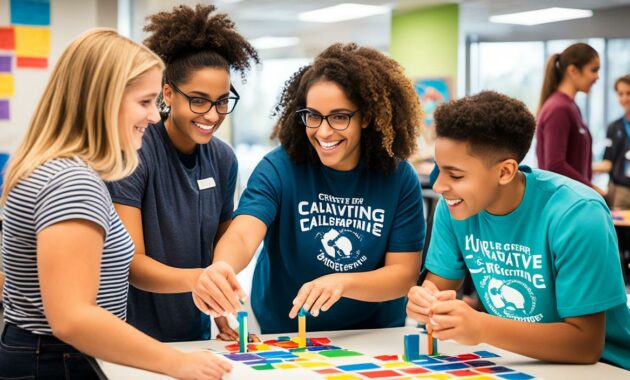The 26th Amendment made voting age 18 in 1971. The 27th Amendment stopped Congress from raising its own pay. If we had a 28th Amendment, students have ideas to fix big issues and make a better future.
These ideas aim to make schools fair for everyone, give everyone healthcare, change voting, and limit gun use. Students want to make a big change for the better.
These proposals show what young people want to change. They focus on school fairness, healthcare, voting, and gun control. Students want to make schools better, get more people involved, and help students feel good about themselves.
Students want to speak up and make a difference. They want to help make laws and rules that affect them. By sharing their ideas, they’re making a path to a fairer and better world.
Empowering Student Voices Through Constitutional Amendments
Student teams from across the U.S. have come up with new ideas for a 28th Amendment. They want to make sure young people’s voices are heard and keep democracy strong.
Proposing New Rights for Equal Education Access
A 4th grade class had a big idea. They want to make sure all schools are fair, so rich and poor areas get the same resources. This would mean every student gets a good education and the tools to do well, no matter where they live.
Ensuring Fair and Unbiased Electoral Processes
A 5th grade class also had a great idea. They want voting to be fair and honest. They suggest limits on how long officials can serve, fair voting numbers, and a team to check voting areas for fairness. These ideas aim to make people trust our democracy more.
These students show us that young people can dream of a better future. They’re fighting for fair schools and honest voting. Their ideas could really change America and get more young people involved in making a difference.
“Our students have boldly stepped forward, offering their vision for a more inclusive and accountable system. Their proposals reflect a deep understanding of the challenges facing our nation and a steadfast commitment to creating positive change.”
| Proposed Amendment | Key Provisions | Potential Impact |
|---|---|---|
| Guarantee Equitable Education |
|
Promote educational equity and level the playing field for students nationwide |
| Secure Fair Electoral Processes |
|
Strengthen the integrity of the democratic system and amplify the voice of the people |
The 28th Amendment: Students’ Vision for Change
The Rendell Center for Civics and Civic Engagement held an essay contest. It was for Philadelphia-area 4th and 5th grade students. They were asked to come up with ideas for a 28th Amendment to the U.S. Constitution. The top students shared their new amendment ideas. They showed how young people want to fix big issues with student-led reforms and constitutional change.
Some ideas included making sure everyone gets the same education, giving everyone healthcare, changing the way we vote, and limiting who can own guns. These student-generated ideas show what the youth think a fair, equal, and fair society should be like.
“Our students have a remarkable grasp of the issues facing our nation and a genuine desire to be part of the solution,” said the Rendell Center’s director. “Their proposals for a 28th Amendment reflect their commitment to shaping a better future through thoughtful constitutional change.”
The top idea was to make it harder for people under 21 to buy guns. It also wanted universal background checks and banned certain types of guns. The students believe this could help stop a lot of gun violence. Every day, over 110 people in the U.S. die from guns.
Another idea was to make healthcare cheaper for everyone. This way, no one would have to worry about not being able to afford medical care. The students think everyone should have the right to healthcare, not just those who can pay for it.
This contest shows how much young people care about changing the country for the better. Their ideas for a 28th Amendment show their big dreams for a fair and just world.
Guaranteeing Healthcare as a Fundamental Right
Students have proposed a 28th Amendment for universal healthcare. They suggest giving everyone the right to healthcare or a pay-what-you-can system. This would make healthcare affordable for everyone, no matter their money.
They want to make healthcare a basic right. This means everyone would have access and could afford it. By pushing for this through a constitutional change, students aim to help all citizens. They want to fix the unfairness in healthcare today.
Pay-What-You-Can Healthcare Coverage for All
The idea is to make healthcare affordable for everyone. No one would be left out because of money. This change would focus on health, not profits.
Students are leading the way to a fair and open healthcare system. They want to make sure everyone gets the care they need.
| Country | Healthcare Expenditure (% of GDP) | Life Expectancy (years) |
|---|---|---|
| United States | 17.7% | 78.6 |
| Canada | 10.8% | 82.0 |
| United Kingdom | 10.2% | 81.2 |
| Germany | 11.2% | 81.1 |
The data shows big differences in healthcare between the U.S. and other countries. Students want a constitutional change to fix this. They want to make sure everyone can get good, affordable healthcare.
“Healthcare is a basic human right, not a privilege. By enshrining this right in the Constitution, we can create a more just and equitable society where no one is left behind.”
These students are part of a big movement. They want to make sure everyone is taken care of. Their hard work could lead to a future where healthcare is a basic right, not a luxury.
Abolishing the Electoral College System
Students across the United States are pushing for a change. They want to fix the Electoral College system. A 5th grade class at the Perelman Jewish Day School suggested a 28th Amendment to get rid of the Electoral College. They think the current system doesn’t always pick the president by popular vote. This goes against democratic values.
These students want a fairer way to choose the president. They think the popular vote should decide, not how states vote. This movement shows a big push for electoral college reform, democratic representation, and popular vote in the U.S.
The student activism shows young people are getting involved in politics. They want to make a difference. Their voices remind us of the power of young people in shaping the future.
| Proposed Amendment Ideas | School |
|---|---|
|
Buckingham Elementary School |
|
Bala Cynwyd Middle School |
|
Queen of Angels Regional Catholic School |
The Buckingham Elementary School’s 5th grade class won first place in the “Citizenship Challenge” essay contest. They came up with ideas to fix the Electoral College and tackle other big issues. Their ideas show how these young students are thinking deeply about democracy and fairness.
The debate on the Electoral College is ongoing. The voices of these student activists remind us of the need for democratic representation. They push for the people’s will to be heard in presidential elections.
Addressing Gun Violence Through Sensible Reforms
A fifth-grade class at Manavon Elementary School in Phoenixville, Pennsylvania, has made a big move. They want to add a 28th Amendment to the United States Constitution. Their goal is to limit who can own guns to only those who need them for the military or hunting.
This shows how much these students care about making things safer for everyone. They want to make sure the Constitution helps stop gun violence. This is a big step towards making a change.
Limiting Firearm Possession for Civilian Use
The 28th Amendment they suggest would limit who can own guns. This is because gun violence is a big problem in America. The OJJDP says 93 people die from gunshots every day, and around 240 get hurt.
Many people support these students. This includes those who want safer guns, religious leaders, doctors, and community members. They believe in rules that make sense to keep everyone safe. These rules could save $40 billion a year in medical costs and lost work.
California is leading the way on this issue. They want to be the first state to call for a Constitutional Convention on gun violence. Governor Newsom and others are working hard to get other states to join in. They want to make sure the students’ ideas are heard and acted upon.
“Our children deserve to feel safe in their schools and communities. This proposed amendment is a critical step in addressing the gun violence epidemic and protecting the lives of generations to come.”
– California State Senator, Melissa Hurtado
new amendment ideas for students
Students today are leading the way in making a difference. They’re pushing for change through constitutional reform. The Rendell Center for Civics and Civic Engagement held an essay contest for 4th and 5th graders in Philadelphia. They asked students to suggest a 28th Amendment to the U.S. Constitution.
Students came up with many creative ideas. They wanted to make education fair, healthcare for all, and change the Electoral College. They also wanted to limit guns for regular people. These ideas show how much they care about making the world better.
One idea was for a fair voting system. This shows how much they value democracy. Another idea was about setting limits on how long politicians can stay in office. They wanted to stop special interests from having too much power.
The students’ ideas are really inspiring. They show how student activism, civic engagement, and educational initiatives can change the future. These young leaders are working hard to make society fairer and more just.
“The younger generation’s vision for positive change and their desire to address critical issues through constitutional amendments reflect their commitment to shaping a more inclusive, equitable, and just society.”
These student projects highlight the need to empower the next generation. By supporting their student activism, we can build a culture of civic engagement. This will lead to important constitutional reform in the future.

Strengthening Civic Education and Engagement
It’s key to get students involved in our democracy. The Rendell Center for Civics and Civic runs the Citizenship Challenge. This contest gets 4th and 5th graders to think deeply about the Constitution and suggest new laws.
This effort helps young people learn about civic duty early on. The top ideas show how well the students get important issues. They also show they want to help our democracy grow stronger.
Promoting Active Citizenship from an Early Age
Learning about civics is more than just knowing facts. It’s about teaching students to be active citizens. The Citizenship Challenge shows this by getting students to join in on democracy and come up with new ideas for society.
Students get to look into, think about, and share their ideas for the Constitution. This hands-on learning makes them feel responsible and gives them the confidence to speak up.
Educating for American Democracy says civic education should teach critical thinking and understanding different views. The Rendell Center’s work matches this idea, helping students learn these key civic skills.
“By engaging 4th and 5th grade students in this civics-focused initiative, the center aims to promote active citizenship and strengthen civic education from an early age.”
Programs like the Citizenship Challenge are key to raising a generation of active, informed citizens. By teaching civic knowledge and skills early, we help students take part in our democracy’s future.
| Key Civic Education Resources | Overview |
|---|---|
| Annenberg Classroom | Offers a free comprehensive multimedia curriculum for teaching the Constitution, including over 60 videos, interactive games, lesson plans, timelines, and more. |
| Civic Renewal Network | Provides free, standards-aligned online classroom resources for teaching civics education. |
| C-SPAN Classroom | Features audio and video clips related to government, history, and other civics topics, with extensive resources for teachers, including Constitution Clips. |
Fostering Inclusive and Equitable Learning Environments
Students want a 28th Amendment to make sure all schools get the same resources. They aim to fix the big gap in education between rich and poor areas. This move is about making sure every student gets what they need to do well.
They want to put the right to fair and equitable education in the Constitution. This means a fair and student-centered learning system for everyone. It’s about giving everyone the chance to learn, no matter their background.
Teachers, leaders, and communities are working hard to make schools more inclusive. For instance, schools in Wisconsin support students who don’t fit traditional gender norms. Schools in Seattle and Chicago also focus on celebrating diversity.
But, making sure all schools are equal is hard. Laws like Lee v. York County School Division and Johnson v. Poway Unified Sch. Dist. have made things tricky. Yet, teachers and supporters keep fighting for fairness. They won a big victory in Oregon, keeping symbols of support like Black Lives Matter and Pride in schools.
The push for a 28th Amendment shows a bright future for education. It’s about giving every student the chance to learn well, no matter where they live. It’s about making sure learning is for everyone, not just some.

“Ensuring equitable access to quality education is not just a lofty ideal, but a moral imperative that will shape the future of our society.”
– Emilie McKiernan Blanton, Education Policy Expert
Establishing Term Limits and Fair Redistricting
Students all over the country are pushing for big changes in how we vote. They want term limits and fair district lines to make our democracy better. A group of 5th graders from Buckingham Elementary School came up with some smart ideas to fix big problems in politics.
They suggested setting limits on how long leaders can stay in office. This would keep power from getting too concentrated. They also wanted each state to have a team that makes sure district lines are fair. This would stop the tricky way of changing district lines to help one party.
These ideas show how much these students care about fair elections and having a government that really represents everyone. They think that making these changes needs to be a big deal, so they want them added to the Constitution.
| Proposal | Rationale |
|---|---|
| Term Limits | To promote political accountability and prevent career politicians from entrenching their power |
| Bipartisan Redistricting Committees | To ensure fair and unbiased electoral districts, eliminating the practice of gerrymandering |
The students are showing they get the big issues in American democracy. They talk about electoral reform, gerrymandering, and the importance of fair elections. Their efforts are an example of how young people can make a big difference.
“Our democracy works best when everyone has a voice. These reforms will help ensure that our elections truly reflect the will of the people.”
– Student Representative, Buckingham Elementary School
Promoting Mental Health Support and Student Wellbeing
We aim to change the education system to put students first. This means making sure they get the mental health support they need. We want schools to be places where everyone feels safe and supported.
Learning should be for everyone, not just the mind. It should also help with feelings and mental health. This way, students can do well in school and grow into caring citizens.
Research shows that teaching mental health in high school can really help. It can cut down on suicide thoughts and attempts. Places with strong mental health programs in schools see fewer suicides and less drug use among teens.
A study found that most teens see anxiety and depression as big issues. Students are stepping up by pushing for laws on mental health. This shows how powerful young people can be in making a difference.
| Initiative | Impact |
|---|---|
| Collaborative for Social and Emotional Learning (CASEL) interventions | Significant improvements in students’ skills, attitudes, behaviors, and academic performance across diverse student populations |
| Florida’s mental health education mandate (at least 5 hours for grades 6-12) | Part of the Hope for Healing Florida initiative focused on promoting mental health and preventing addiction |
| SAMHSA’s Project AWARE grant program in 2020 | Awarded to 14 states and one territory to support youth mental health |
Putting student mental health first is key. With the right academic support and inclusive learning environments, we can change education for the better. This will help the next generation succeed in life.
“Half of all mental illness cases begin by age 14, highlighting the importance of providing tools and support through mental health education to help children navigate challenges and succeed.”
Amplifying Student Voices in the Legislative Process
The Rendell Center’s Citizenship Challenge essay contest lets students directly engage with the law-making process. They can suggest ideas for a new 28th Amendment to the U.S. Constitution. This shows how important it is to listen to young people and let them help shape laws that affect them.
Ragan Stoltz from Arizona, Livia Valentine from California, Mahder Dereje from the District of Columbia, and many others are making their voices heard. They are learning how to make a difference and encouraging others to join in.
This focus on students is key to teaching the next generation to be active, informed, and responsible citizens. Sudarshan Prasanna from Georgia, the editor of The Lambert Post, says, “By getting students involved in making laws, we help them understand our democratic system better. We empower them to be the change they want to see.”

